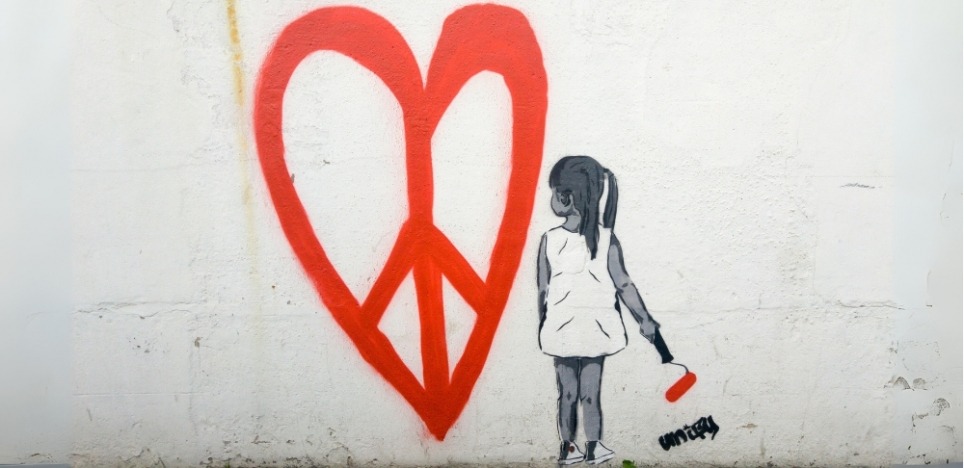I am haunted by the news I woke to Saturday morning (October 7, 2023).
And I am haunted by a message I received from a colleague Sunday morning, characterizing my response to the news as “a neutral stance.” I had thought my response was an attempt at compassion for all those affected by inhumane violence and injustice. I had thought I was being a responsible and informed voice in a complex situation. As a lover of Howard Zinn, the word “neutral” rattled my sense of self.
I spent the weekend practicing compassion; in truth, I was also testing it: Do I have compassion for all victims of violence? Am I being “neutral”? Is the former indistinguishable from the latter? Is complexity possible right now?
I scrolled through the posts of my Jewish and Israeli friends and checked in on some of them by text. I contacted Muslim friends and others who had made a point of visiting Palestine. I read Al-Jazeera’s reporting. A video from a scholar of the conflict popped up on Tik Tok. The detail he provided about everyday injustice and apartheid in Gaza was informative, so I “liked” it. When I tried to go back to it, it had disappeared.
I ended the weekend virtually attending a vigil for Israeli victims at a local temple. The rabbi called the Saturday attacks a “pogrom,” and I looked up the word to make sure I understood him. I sensed the Holocaust grief in the room, which I will never fully understand but will always feel moved by. I logged off after a round of applause for the Israel Defense Forces and Israel Defense Forces veterans.
And then, on Columbus Day no less, I reflected, and I realized there was one sentiment I saw too often. Voices from different sides of the conflict insisting that, this time, finally, it’s simple: “There is only one side to this story.”
I want to say that I understand this impulse. It comes from the effects of trauma on the brain and body. It comes from overwhelm. It comes from feeling dismissed on a communal, national, and international scale. It comes from institutional hate, genocide, and apartheid.
And also, I invite all of us to resist the single or one-sided story, and embrace complexity as a tool of peace. I invite complexity because it is the opposite of propaganda, which flattens our spiritual being, threatening compassion and justice alike.
In this moment, there is physical and psychological danger to Israelis, to those in Gaza and the West Bank, and to those worldwide who are Jewish, Palestinian, or Muslim.
And for all of us there is the danger of becoming rigid. Of choosing a side that alienates us from other truths and other people. Let those of us who are spared the physical dangers of war at least commit to the struggle of complexity. Let us commit to holding many truths to be self-evident.
This is a time to speak and work against violence and for peace. And to practice peace as we leverage the smaller mechanisms of our world: peace in the relationships through which all change occurs, online and down the hall and over the fence; peace in the intrapersonal space of our own hearts, minds, and spirits.
Here’s some help.
Rabbi Michael Lerner holds the complexities of Israel-Palestine with astounding nuance and sensitivity in his book Healing Israel/Palestine. For a review, click here.
If you find yourself struggling to listen or to be heard, if debating over social media has depleted your spirit, spend some time with this meditation, a step-by-step guide to developing compassion for difficult people.
To heal separation and polarization and nurture connections, contemplate Buddhist spiritual teacher Thich Nhat Hanh’s poem “Please Call Me by My True Names.” See a visual meditation and reading of the poem from Vol. 6 of the Spiritual Literacy Film Series.
Gather some friends (and some enemies) and read aloud this litany, presented during the grief and tension following 9/11 and based on the Prophet Muhammad’s words about peace and justice.
If you are planning to attend a demonstration or protest, consider these practices for holding unity amid differences.
As the media presents you with dehumanizing images, try this practice from Rabbi Rav Kook.
Repeating this simple prayer can balance difficult days with hope and encouragement.
The mechanisms of war are out of our grasp, but every step we take can contribute to peace in the world. Peacemaker John Dear offers 12 prompts for practicing peace every day.
In our “Praying the News” blog, we first posted A Prayer for the End of Violence between Israel and Palestine in 2014. We are praying it again now.
"Peace Is the Way" is a collection of quotes for peacemakers that you may want to share in your emails, social media, bulletin boards, talks, sermons, etc.
Main Image Source: "Peace and Love graffeti" by R4vi from Leicester, England is licensed under CC BY 4.0.
